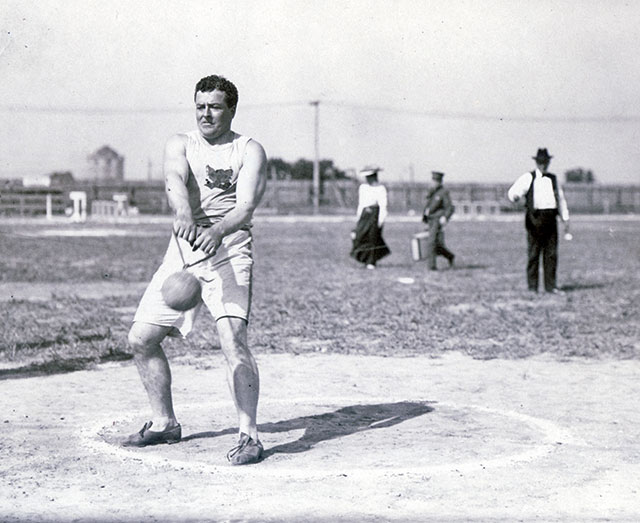The 56-pound (25.4 kilogram) weight throw for distance event was held twice, in 1904 and 1920. It was part of the track and field athletics program. There is a similar event in the Scottish Highland Games, and is not unlike the Track and Field event of the hammer throw. Unlike in the Highland Games, competitors in the 56 lb weight toss are allowed to use two hands.
 John Flannigan performing the 56 pound hammer throw at the 1904 Olympics
John Flannigan performing the 56 pound hammer throw at the 1904 OlympicsThe 1904 winner was Etienne Desmarteau, a Montreal policeman who defeated crowd favorite John Flanagan, a New York policeman. His throw measured 34 feet, 4 inches (10.47 meters). The 1920 winner was Patrick McDonald, was 6-foot-5-inch, 325-pound Times Square traffic cop. McDonald was also second in the two-handed shot.
The 1904 all-round event also included the 56 pound weight throw as one of the ten events. The other events in this early decathlon were the 100 yard dash, shot put, high jump, 880 yard walk, hammer throw, pole vault, 120 yard hurdles, long jump and 1 mile run.
56 Pound Toss Results
1904 Olympics
- Étienne Desmarteau (Canada) 10.46 m
- John Jesus Flanagan (USA) 10.16 m
- James Mitchel (USA) 10.13 m
1920 Olympics
- Patrick McDonald (USA) 11.265 m
- Patrick Ryan (USA) 10.965 m
- Carl Johan Lind (Sweden) 10.255 m
Related Pages
- Other Track and Field discontinued events
- Shot Put at the Olympic Games
- A similar event is part of the Highland Games
- About the Stone Throw, a discontinued Olympic event held only once, in 1906.
- Full list of all Discontinued Events
- About the Scottish Highland Games


 Upcoming Events
Upcoming Events